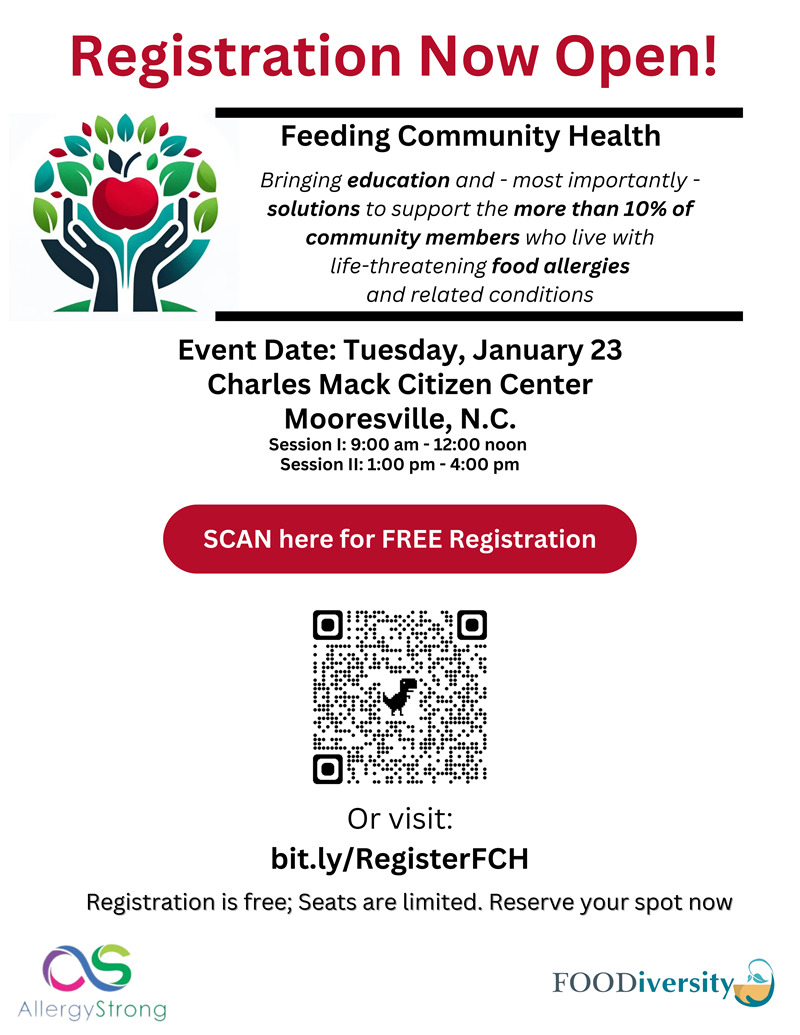
Special to Iredell Free News
Did you know that one in 10 people live with a food allergy? Studies also show that 25 percent of Americans avoid an allergen when they shop for food. That’s 85 million people in the U.S.
Learning the best strategies for managing food allergies takes time and resources that many don’t have. FOODiversity, a Mooresville-based nonprofit, and national nonprofit AllergyStrong hope to change that.
FOODiversity and AllergyStrong are bringing together individuals with food allergies, their caregivers, as well as healthcare workers and community organizations that support them, to discuss ways to increase access to healthcare, resources, and improve overall quality of life. Their event, called Feeding Community Health – scheduled for January 23 at the Charles Mack Citizen Center in Mooresville — will be an informative, solutions-driven one-day event held in two half-day sessions.
There is no cure for food allergies. People who have them must strictly avoid their allergen to stay healthy and safe.
“But avoiding a food isn’t as simple as it sounds,” said Erin Malawer, executive director of AllergyStrong. “Food labeling can be unclear. Plus, allergens aren’t confined to food and not limited to the family member who has them.”
They are found in countless products including soaps, cleaning products, and medication.
“I read the labels of the toothpaste we buy, the shampoo I use, and the lip balm I wear so I can safely kiss my son good night,” Malawer added.
Finding allergen-friendly substitutions can be challenging. Not only are products more limited in choice and supply, but they are also expensive. Allergen-friendly food products are often up to five times as expensive as their regular counterparts. And sourcing that food can be tremendously difficult, especially in times of need.
As Wendy Gordon Pake, Founder of FOODiversity pointed out, “Whole communities bear the economic burden of food allergies. Studies show food allergies in children alone costs the U.S. $25 billion a year — a great portion of which is borne by families, not the healthcare system.”
Studies show that the impact of food allergies – both economic and emotional – is felt well beyond an individual. This is why community groups such as schools, local government, food pantries and food banks, social services, therapists, and environmental and housing organizations play such a critical role. Their tailored support for students and citizens with food allergies can contribute greatly in the well-being and health outcomes of an entire family.
Feeding Community Health is an event that highlights the impact that food allergies has on a whole community and addresses ways that these organizations, as well as healthcare providers, emergency workers, pharmacists, and others, can help their patients manage this life-threatening condition more effectively. The event will bring together these organizations to help them create efficient strategies to better support people with food allergies and related conditions. Topics will include nutritional security, social determinants of health, attitudes towards epinephrine, patient communication, prevention, and effective government initiatives.
Those who live with food allergies, or care for someone who does, know the burden of food allergies all too well. The challenges of living with a life-threatening food allergy go beyond the increased expense and the complicated logistics of managing them safely. They also take a heavy psychological and emotional toll, often leaving those affected by them feeling anxious, exhausted, singled out, excluded, and scared.
Feeding Community Health offers programming for people managing food allergies to help simplify life, inform decision-making, and reduce the burden of this condition. The event will share the latest information about food allergy diagnosis, cover food allergy management and treatment options, and spell out effective nutrition and dietary strategies including how to access safe, affordable food. It will also offer sessions on managing food allergies at school, effective doctor/patient communication, and ways to reduce risk.
Food allergies is a growing condition. The rate of peanut allergy alone has tripled over the past 30 years, so it’s no wonder it is often referred to as an epidemic. FOODiversity and AllergyStrong are leading efforts to help alleviate the burden of this condition and protect the growing number of people affected by these conditions where they live through Feeding Community Health. In doing so, they hope to contribute to the building of strong, supportive communities.
LEARN MORE
For additional information about the Feeding Community Health event, including the registration link, sponsorship opportunities, and agenda highlights, visit https://bit.ly/FCHCarolinas or email info@FOODiversity.org.
About AllergyStrong
AllergyStrong is a national non-profit organization dedicated to increasing access to healthcare, treatment, and resources as well as enhancing protections for those living with food allergies. AllergyStrong is strongly focused on strengthening resources for the underserved community with food allergies and related conditions by working with community organizations who serve them at the local, state, and federal levels.
About FOODiversity
Founded in 2020, FOODiversity is headquartered in Mooresville and serves food-insecure customers, who have food allergy, celiac disease or food intolerance, across the United States. The 501(c)(3) nonprofit also collaborates with dedicated partners to bring national resources to local communities, in order to serve community members who are often overlooked in the U.S. charitable food system. The FOODiversity mission is to prevent hunger, medical emergencies, and hospitalizations by raising awareness, providing educational support, and increasing access.



